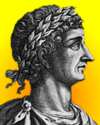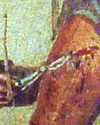 (source)
(source)
|
Publius Ovid
(20 Mar 43 B.C. - 17)
Roman poet who ranks with Virgil and Horace as one of the great poets of Latin literature.
|
Publius Ovid
“Some wounds are made worse”
Illustrated Quote - Medium (500 x 350 px)

Some wounds are made worse by treatment, as we see: it had been better not to touch them.
More Publius Ovid quotes on science >>
A more common translation of this quote is commonplace in books and on the web: “Some wounds grow worse beneath the surgeon’s hand; ’Twere better that they were not touched at all.”1 Which seems to belong to a medical treatment context. WRONG! On looking at the original Latin text, no word in it is remotely about either a surgeon or a hand. Thomas Benfield Harbottle translated using a much too liberal poetic licence. This isl understood from a closer look at the original Latin text, as below. Which is why Webmaster chose to use another translation, by Arthur Leslie Wheeler that is closer to the original, shown above as the subject quote.
The original Latin text is Curando fieri quaedam majora videmus vulnera, quae melius non tetigisse fuit. Putting it through Google’s translation engine, the raw literal result is: “We see greater things to be done taking care of the kind of wounds, which would be better not to touch them.” Rather clumsy, but using Google translate and checking word by word, there is no surgeon and no hand to be found in the original text.
Digging deeper into the context means taking a larger view of the text, thus:
Spem iuvat amplecti, quae non iuvat inrita semper, et, fieri cupias siqua, futura putes. Proximus huic gradus est bene desperare salutem seque semel vera scire perisse fide. Curando fieri quaedam maiora videmus vulnera, quae melius non tetigisse fuit. Mitius ille perit, subita qui mergitur unda, quam sua qui tumidis brachia iactat aquis. Cur ego concepi Scythicis me posse carere finibus et terra prosperiore frui? Cur aliquid de me speraui lenius umquam? An fortuna mihi sic mea nota fuit? Torqueor en gravius repetitaque forma locorum…”
Fortunately, the heavy lifting has been done in the translation by Arthur Leslie Wheeler:
“Tis good to embrace a hope—though it bring no good and be ever vain—and whatever you long for that you may deem will happen. The next stage is utterly to give up hope of salvation, to know once and for all with full assurance that one is lost.
More merciful is his death who is suddenly overwhelmed by the waters than his who wearies his arms in the heaving seas. Why did I conceive it possible for me to leave the Scythian land and enjoy a happier one? Why did I ever hope any mercy for myself? Was it thus that I had come to know my fate? Lo! my torture is all the worse…”
So, from the bigger picture, is becomes clear that the context is solely concerning emotional wounds. No blood involved. No surgeon. No stitches. For this emotional wound, Ovid says better not to drag it out, by trying to fix it up. No. Just take a quick end instead. A much darker meaning than anything about a surgeon’s hand!
The conclusion is thus. To use this quote in the context of surgical medical treatment is far out of context - unless used only in a metaphorical sense. Anguish and sorrow are the wounds referred to. So Webmaster suggests the quote is best used in a context similar to the familiar phrase, “don't open old wounds.” Take care how you console someone going through grief. Don't bring the subject up, if the trying to help, interrupts a natural healing process.
- Science Quotes by Publius Ovid.
- Publius Ovid - context of quote “Some wounds are made worse” - Large image (800 x 600 px)





